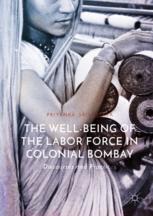

Most ebook files are in PDF format, so you can easily read them using various software such as Foxit Reader or directly on the Google Chrome browser.
Some ebook files are released by publishers in other formats such as .awz, .mobi, .epub, .fb2, etc. You may need to install specific software to read these formats on mobile/PC, such as Calibre.
Please read the tutorial at this link: https://ebookbell.com/faq
We offer FREE conversion to the popular formats you request; however, this may take some time. Therefore, right after payment, please email us, and we will try to provide the service as quickly as possible.
For some exceptional file formats or broken links (if any), please refrain from opening any disputes. Instead, email us first, and we will try to assist within a maximum of 6 hours.
EbookBell Team

4.8
94 reviewsThis study draws on extensive archival research to explore the social history of industrial labor in colonial India through the lens of well-being. Focusing on the cotton millworkers in Bombay in the late nineteenth and early twentieth centuries, the book moves beyond trade union politics and examines the complex ways in which the broader colonial society considered the subject of worker well-being. As the author shows, worker well-being projects unfolded in the contexts of British Empire, Indian nationalism, extraordinary infant mortality, epidemic diseases, and uneven urban development. Srivastava emphasizes that worker well-being discourses and practices strove to reallocate resources and enhance the productive and reproductive capacities of the nation’s labor power. She demonstrates how the built urban environment, colonial local governance, public health policies, and deeply gendered local and transnational voluntary reform programs affected worker wellbeing practices and shaped working class lives.